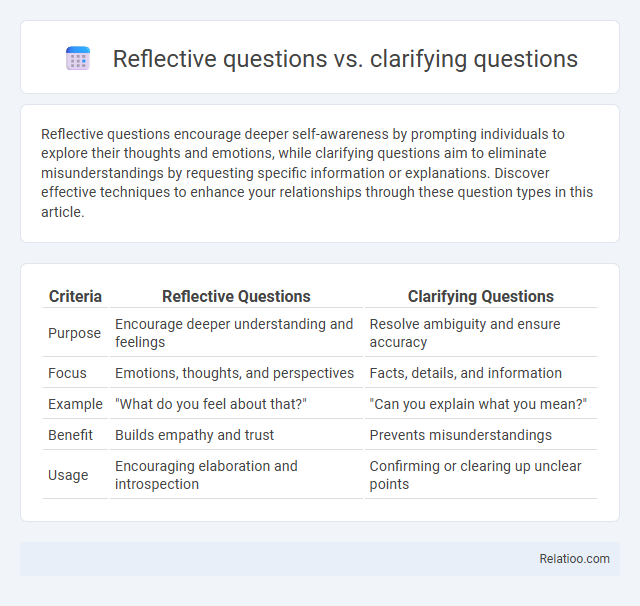Reflective questions encourage deeper self-awareness by prompting individuals to explore their thoughts and emotions, while clarifying questions aim to eliminate misunderstandings by requesting specific information or explanations. Discover effective techniques to enhance your relationships through these question types in this article.
Table of Comparison
| Criteria | Reflective Questions | Clarifying Questions |
|---|---|---|
| Purpose | Encourage deeper understanding and feelings | Resolve ambiguity and ensure accuracy |
| Focus | Emotions, thoughts, and perspectives | Facts, details, and information |
| Example | "What do you feel about that?" | "Can you explain what you mean?" |
| Benefit | Builds empathy and trust | Prevents misunderstandings |
| Usage | Encouraging elaboration and introspection | Confirming or clearing up unclear points |
Introduction to Reflective and Clarifying Questions
Reflective questions encourage deeper thinking by prompting individuals to consider their feelings, experiences, and underlying meanings, enhancing self-awareness and insight. Clarifying questions aim to eliminate confusion by seeking specific details or explanations, ensuring clear understanding and accurate communication. Both types of questions play crucial roles in effective questioning techniques, fostering meaningful dialogue and improved problem-solving.
Defining Reflective Questions
Reflective questions are designed to encourage deeper thinking by prompting individuals to consider their own thoughts, feelings, and experiences, facilitating self-awareness and personal insight. Clarifying questions aim to ensure understanding by requesting more detail or explanation, reducing ambiguity in communication. Questioning broadly encompasses various types of inquiries used to gather information, stimulate thinking, or guide conversations, with reflective questions specifically focusing on introspective and evaluative responses.
Defining Clarifying Questions
Clarifying questions are specific inquiries aimed at eliminating confusion by requesting additional details or explanations, ensuring precise understanding of information. Unlike reflective questions, which encourage deeper thinking about personal experiences, clarifying questions focus on obtaining clear, concise answers to ambiguous or vague statements. Effective use of clarifying questions improves communication accuracy and helps avoid misunderstandings in conversations and decision-making.
Key Differences Between Reflective and Clarifying Questions
Reflective questions encourage deeper thinking by prompting you to consider your feelings, thoughts, or experiences, fostering self-awareness and insight. Clarifying questions aim to eliminate confusion or ambiguity by seeking specific information or explanations to ensure understanding. While questioning is a broad technique encompassing both types, the key difference lies in reflective questions promoting introspection, whereas clarifying questions target precise comprehension.
Purpose and Context of Reflective Questions
Reflective questions aim to deepen understanding by encouraging you to think critically about your experiences and emotions, fostering self-awareness and insight. Unlike clarifying questions, which seek precise information or explanation, reflective questions focus on exploring meanings, motivations, and personal interpretations within a given context. This purpose makes reflective questions especially valuable in coaching, therapy, and educational settings where personal growth and comprehension are the primary goals.
Purpose and Context of Clarifying Questions
Clarifying questions serve the purpose of ensuring understanding by seeking specific details or explanations, particularly in complex or ambiguous contexts. They help eliminate confusion and confirm the accuracy of information, making them essential in both educational and professional settings to foster clear communication. Unlike reflective questions, which encourage deeper thinking, or general questioning that explores broad topics, clarifying questions narrowly target clarity and precision.
Examples of Reflective Questions
Reflective questions, such as "What emotions did you experience during the project?" and "How do you think your approach influenced the outcome?" encourage deeper self-awareness and critical thinking, helping you gain valuable insights. Clarifying questions like "Can you explain what you meant by that?" or "Could you provide more details about the timeline?" aim to clear up confusion and ensure understanding. Questioning, in a broader sense, involves using various types of questions to gather information, solve problems, and stimulate discussion effectively.
Examples of Clarifying Questions
Clarifying questions seek to clear up confusion and ensure understanding, such as "Can you explain what you meant by 'effective strategy'?" or "What specific challenges are you referring to in this project?" These questions differ from reflective questions, which often prompt deeper thinking or self-reflection, like "How do you feel about the results?" Questioning broadly covers all types of inquiries, including clarifying, reflective, and probing questions, with clarifying ones specifically designed to gather precise information and avoid misunderstandings.
Choosing Between Reflective and Clarifying Questions
Reflective questions encourage deeper thinking by prompting individuals to consider their feelings or experiences, while clarifying questions seek specific information to eliminate confusion. Choosing between reflective and clarifying questions depends on the context: use reflective questions to explore emotions or thoughts and clarifying questions to ensure understanding of facts or details. Effective communication balances both types to foster insight and accuracy in conversations.
Enhancing Communication Through Effective Questioning
Reflective questions encourage deeper thinking by prompting individuals to review their thoughts and experiences, fostering self-awareness and insight. Clarifying questions focus on ensuring understanding by seeking specific information or elaboration, reducing ambiguity in communication. Questioning, as a broader practice, strategically guides conversations, enhances engagement, and facilitates clearer, more meaningful exchanges essential for effective communication.

Infographic: Reflective questions vs Clarifying questions
 relatioo.com
relatioo.com